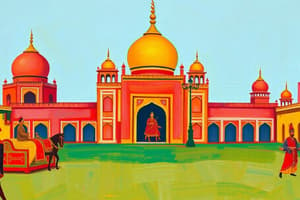Podcast
Questions and Answers
Who was the founder of the Mughal Empire?
Who was the founder of the Mughal Empire?
- Humayun
- Babur (correct)
- Tamerlane
- Timur
Which Central Asian conqueror was Babur a descendant of?
Which Central Asian conqueror was Babur a descendant of?
- Julius Caesar
- Napoleon Bonaparte
- Genghis Khan (correct)
- Alexander the Great
What were the Mughals known for in terms of art and culture?
What were the Mughals known for in terms of art and culture?
- Pottery making
- Sculpture carving
- Patronage of the arts (correct)
- Metalworking
Who was the son of Babur and the second Mughal Emperor?
Who was the son of Babur and the second Mughal Emperor?
Which Mughal Emperor is known for his great love for his wife Mumtaz Mahal?
Which Mughal Emperor is known for his great love for his wife Mumtaz Mahal?
What was the lasting impact of the Mughals on Indian language?
What was the lasting impact of the Mughals on Indian language?
Who was the third Mughal Emperor known for his tolerance and efforts to spread Islam throughout India?
Who was the third Mughal Emperor known for his tolerance and efforts to spread Islam throughout India?
Which Mughal Emperor was a great patron of the arts and literature?
Which Mughal Emperor was a great patron of the arts and literature?
What did the Mughals introduce to India that had a significant impact on warfare?
What did the Mughals introduce to India that had a significant impact on warfare?
Which Mughal Emperor attempted to restore the Muslim community to its former position of power?
Which Mughal Emperor attempted to restore the Muslim community to its former position of power?
Study Notes
The Great Mughals Class 7: Mughal Empire, Mughal Rulers, and Mughal Influence
The Mughal Empire, which emerged in the early 16th century, is an important part of Indian history. It was founded by Babur, who was a descendant of Timur, a Central Asian conqueror, and Tamerlane, a Mongol conqueror. The Mughal Empire was known for its powerful and well-organized military, a centralized bureaucracy, and a culture of art, architecture, and literature that left a lasting impact on the Indian subcontinent.
Mughal Empire
The Mughal Empire, also known as the Mughal Empire of India, was a Muslim empire that ruled much of South Asia from 1526 to 1857. It was established when Babur, the founder of the Mughal Empire, conquered the Delhi Sultanate. The empire was known for its strong military, centralized administration, and a culture of art, architecture, and literature. The Mughals were known for their patronage of the arts, and their rule saw the development of the Mughal style of painting, which is characterized by its vivid colors, intricate details, and a focus on human emotion.
Mughal Rulers
-
Babur: Babur was the founder of the Mughal Empire and was a descendant of Timur and Tamerlane. He was a great military leader and poet. He was born in Uzbekistan and began his military career at the age of 11.
-
Humayun: Humayun was the son of Babur and the second Mughal Emperor. He was a talented ruler who conquered much of India, but he was overthrown by his cousin, Sher Shah Suri.
-
Akbar: Akbar was the third Mughal Emperor and is considered one of the greatest of all Mughal rulers. He was known for his tolerance and his efforts to spread Islam throughout India. He was a great military leader and expanded the empire to its greatest size.
-
Jahangir: Jahangir was the fourth Mughal Emperor and was the son of Akbar. He was a great patron of the arts and literature and was known for his love of painting.
-
Shah Jahan: Shah Jahan was the fifth Mughal Emperor and is known for his great love for his wife Mumtaz Mahal. He was a great patron of the arts and architecture and built the Taj Mahal as a mausoleum for his wife.
-
Aurangzeb: Aurangzeb was the sixth and last great Mughal Emperor. He was a devout Muslim and attempted to restore the Muslim community to its former position of power.
Mughal Influence
The Mughal Empire had a profound influence on Indian culture and society. The language of the court was Persian, and this had a lasting impact on the development of the Urdu language. The Mughals also introduced Persian and Central Asian art styles to India, which had a lasting impact on Indian art and architecture. The Mughals also introduced gunpowder and firearms to India, which had a significant impact on Indian warfare.
The Mughal Empire also had a profound impact on Indian politics. The Mughals created a centralized bureaucracy and a system of law and order that helped to create a stable and prosperous empire. The Mughals also established a system of patronage, where the ruler supported the arts and literature, which helped to create a culture of art, architecture, and literature that has lasted to this day.
In conclusion, the Mughal Empire played a significant role in Indian history. The Mughal rulers were powerful and well-organized military leaders, centralized administrators, and great patrons of the arts, architecture, and literature. Their influence can still be seen in India today, in the form of the Urdu language, Persian and Central Asian art styles, and the system of patronage.
Studying That Suits You
Use AI to generate personalized quizzes and flashcards to suit your learning preferences.
Description
Test your knowledge about the Mughal Empire, its rulers, and their profound influence on Indian culture and society. Learn about Babur, Humayun, Akbar, Jahangir, Shah Jahan, Aurangzeb, and the lasting impact of the Mughal Empire on art, architecture, language, and warfare in India.




